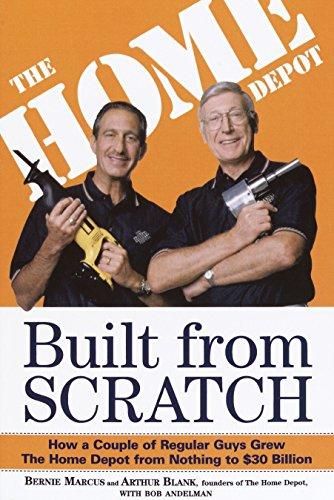Bernie Marcus and Arthur Blank, co-founders of The Home Depot, tell their tale of starting with an idea and building an empire by offering business advice and sound moral modeling.

Two Good Guys Succeed
Before The Home Depot existed, if you planned a do-it-yourself project – say, to install a new kitchen – you had to visit several stores to find the requisite tools and materials. Now, you can buy it all at big-box retailers, such as Home Depot and Lowe’s. Home Depot’s founders Arthur Blank and Bernie Marcus – writing with Bob Andelman – relate the DIY chain store’s history and outline its determination to deliver top customer service, quality merchandise and reasonable prices. Many of its salespeople are master plumbers, electricians, carpenters and other craftsmen, and the stores offer classes, gardening help, and more. The founders offer an informed and fond insider’s take on the big-box that revolutionized retail.
I ascended the ladder of success…by learning how important the folks are with whom you surround yourself. I loved teaching people the business. Why have I been successful my whole life? Because I surrounded myself with people who are better than I am.Arthur Blank and Bernie Marcus
Marcus, founding CEO and chairman, and Blank, founding president, provide some guidance for retailers, but the core of their tale is the saga of two guys who liked working together and hit it big with imagination and diligence. They basically just share the adventures, feuds, triumphs and setbacks that amused them most. Surprisingly, their corporate history proves entertaining and even endearing. Marcus and Blank portray themselves as good guys who weren’t afraid to be tough when they had to be – and that’s how they come off.
Foremost on the companion reading list for this memoir is Sam Walton’s Sam Walton: Made in America, another first-person saga by a triumphant big box icon. Next is a compelling hagiography, though one written by an outsider, Brad Stone’s The Everything Store about Amazon and Jeff Bezos.
Bad Bernie’s Buildall
Marcus and Blank describe the revolutionary concept behind the company they launched on June 22, 1979: a one-stop warehouse-type store for home-improvement and do-it-yourself (DIY) projects.
They start with a broad overview, explaining that The Home Depot began with four Atlanta-area stores and became the United States’ largest home-improvement/DIY retailer. It also has numerous stores in other countries. The authors proudly share mind-boggling statistics: As of their writing, The Home Depot had “775 stores, 160,000 associates and $30 billion in sales.” Marcus and Blank, never desperate to hog the spotlight, credit merchandising wizard Pat Farrah and New York investment banker Ken Langone, who organized the initial group of investors, as co-founders.
The authors reveal that they first considered calling their store Bad Bernie’s Buildall or MB’s Warehouse. Instead, they report gratefully, investor Marjorie Buckley came up with “The Home Depot.”
Rip Fleming, Banker
After the authors arranged for their initial Atlanta retail space, they had no money for inventory. Marcus reached out to banking executive Rip Fleming at Security Pacific National Bank in Los Angeles for a $3.5 million line of credit. Despite Marcus and Blank’s earlier successes with the Handy Dan hardware chain, Fleming’s bosses, the authors lament, repeatedly turned them down.
When we opened our first stores, we had so few customers that if I saw someone leaving a store empty-handed, I took it personally.Arthur Blank and Bernie Marcus
Without that line of credit, The Home Depot would not exist, but Marcus later found out Fleming had put his job on the line for the transaction after his bosses said no three times. Years later, Fleming retired from the bank, and – demonstrating the loyalty that emerges as a crucial theme of Marcus and Blank’s management style – The Home Depot hired him as a consultant. After Fleming joined the company, it sent him and his wife on a luxury world tour.
Bernie Marcus
Marcus relates that he grew up in a tenement in Newark, New Jersey, the son of poor Russian Orthodox Jewish immigrants. He wanted to be a psychiatrist, but could not afford college or med school.
Instead, he went into discount retail. His ascent took him, he notes, from United Shirt Shops to Spears Fifth Avenue in Manhattan to the Two Guys discount store in New Jersey. Before long, Marcus shares, he was in charge of more than $1 billion in business at Two Guys.He works through his path to becoming an executive with the Handy Dan Home Improvement Centers, where he became chairman and CEO – and met Arthur Blank.
Arthur Blank
Blank grew up in Queens, New York. He studied accounting and worked at Arthur Young & Company. In time, Blank explains, he joined his family’s mail-order pharmaceutical business, later purchased by the Daylin Corporation, owner of Handy Dan. Marcus and Blank rejoice in the fateful day when Marcus offered Blank a corporate job at Handy Dan. The two explains that they became best friends working closely together, and they recollect the day in April 1978 when Daylin’s CEO fired them both. Langone told them to seize on being fired as the opportunity to “open up that store you talked about.”
Core Values and Management Principles
The authors identify The Home Depot’s values as the drivers of its operation and mind-set. As you might expect, these values prove adamantly people-centric and rooted in a straightforward, deceptively simple moral code that revolves around reciprocity, community, customer focus, employee satisfaction, fiscal prudence, commonsense management, return on value for shareholders and commitment to excellence. Their legacy – and hope – is that The Home Depot should continue to adhere to these values.
We’re in the training business: There are “colleges” for learning flooring, kitchen, bath, millwork and even our computerized cash registers.Arthur Blank and Bernie Marcus
Marcus and Blank make it clear that the company’s values and its management principles are entwined and that each set nourishes the other. Marcus retired from The Home Depot in 2002 and, in 2014, he founded the nonprofit Job Creators Network Foundation. Blank now owns the Atlanta Falcons of the National Football League and Atlanta United, a major league soccer team. But unlike many corporate profiles that cite values and managerial philosophies that faded away over time, the authors set out the principles they designed to have a permanent influence on the corporation’s trajectory.
Two Good Guys
Just try to read this memoir and then dislike Marcus and Blank. Though the two make no secret of the enemies they’ve made, and admit to their own irritating qualities and, at times, ruthless business practices, they read as unpretentious, down-to-earth guys who really did believe in and support their employees and customers. Their writing, which is conversational and filled with slang, clearly expresses the authors’ idiosyncratic personalities. For all the worthy practical lessons they provide, your strongest takeaways will likely be their inherent likeability and how determined they were to have their company manifest what they regard as their best, most nurturing qualities.






